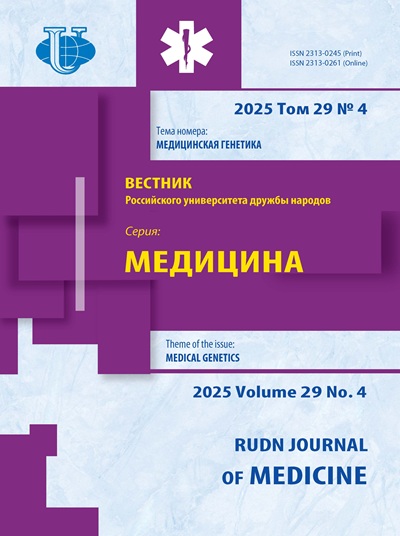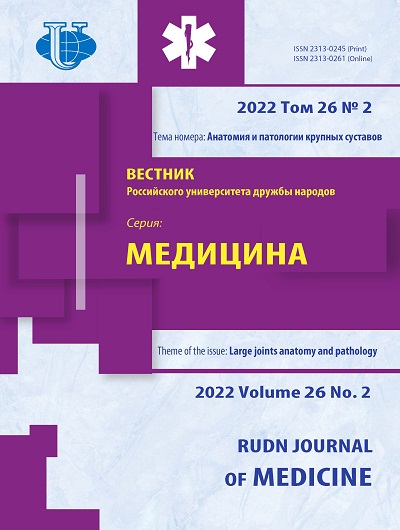Glenoid cavity morphometric study in human scapula
- Authors: Sinsinwar P.1, Chawla M.2, Mishra A.3, Sharma D.K.4
-
Affiliations:
- Yogita Dental College and hospital
- Alfalah school of medical science and research centre
- K.D. Medical College and Hospital
- Yashwant Singh Parmar Government Medical College
- Issue: Vol 26, No 2 (2022): LARGE JOINTS ANATOMY AND PATHOLOGY
- Pages: 150-156
- Section: LARGE JOINTS ANATOMY AND PATHOLOGY
- URL: https://journals.rudn.ru/medicine/article/view/31076
- DOI: https://doi.org/10.22363/2313-0245-2022-26-2-150-156
- ID: 31076
Cite item
Full Text
Abstract
Relevance. Scapula is one of the bones that takes part in the formation of shoulder joint and has variable morphology. It is weak joint because glenoid cavity is variable in vertical diameter and transverse diameter. Hence glenoid cavity is shallow and gives rise to frequent dislocation of shoulder joint. Aim of the present study was to know various dimensions of glenoid cavity like vertical diameter and horizontal diameter and their variations in percentages. Materials and Methods. Fifty unknown dry human scapulae from the department of anatomy (Mahatma Gandhi Medical College, Sitapura, Jaipur, Rajasthan, India) constituted the materials for the present study. Each scapula was studied for glenoid cavity. The vertical diameter and horizontal diameters were studied from each above scapula. Twenty five scapulae were from right side and twenty five were from left side. The different shapes of glenoid cavity were observed. The shapes were pear shaped, inverted comma shaped and oval shaped. Results and Discussion. In the present study pear shaped glenoid cavity was found in 56 %, Inverted comma shape was found in 26 % and oval shape was observed in 18 %. The most common shape was pear shape (56 %) and least common shape was oval shape (18 %). The mean glenoid height was 35.52 mm. The maximum glenoid height was 41.22 mm and minimum glenoid height was 30.19 mm. The mean glenoid width was 20.77 mm. The maximum glenoid width was 24.31 mm and minimum glenoid width was 17.93 mm. Conclusion. Study showed that glenoid cavity has varied morphology. This varied morphology will be of great useful in various clinical and surgical procedures like hip replacement and in posterior glenoid osteotomy.
About the authors
Pankaj Sinsinwar
Yogita Dental College and hospital
Email: Pankajsinsinwar1994@gmail.com
ORCID iD: 0000-0002-8806-947X
Khed, Maharashtra, India
Maheshwar Chawla
Alfalah school of medical science and research centre
Email: Pankajsinsinwar1994@gmail.com
ORCID iD: 0000-0001-7738-7811
Dhauj, Hariyana, India
Abhibhusan Mishra
K.D. Medical College and Hospital
Email: Pankajsinsinwar1994@gmail.com
ORCID iD: 0000-0002-3448-6569
Mathura, Uttarpradesh, India
Devesh Kumar Sharma
Yashwant Singh Parmar Government Medical College
Author for correspondence.
Email: Pankajsinsinwar1994@gmail.com
ORCID iD: 0000-0003-3368-3576
Nahan, Himachal Pradesh, India
References
- Prescher A, Klumpen T. Does the area of glenoid cavity of the scapula sexual Dimorphism. Journal of Anatomy. 1995;186:223-226.
- Mallon WJ, Brown HR, Vogler JB, Martinez S. Radiograpic and geometric anatomy of the scapula. Clin Orthop Relat Res. 1992;277:142-54.
- Fick R, Frazer G. Anatomie der Gelenke. Handbuch der Anatomie des Mensechen. ed. von Bardelleben. 1904. 732 p.
- Datta AK. Essentials of Human Anatomy, 3rd ed. Current Books International. 2004. 480 p.
- Von Langer C. Lehrbuch der systematischen und topographischen Anatomie, 2 Aufl. Leipzig: Braumuller. 1882. 895 p.
- Frazer JE. The Anatomy of Human skeleton. 5th edition. London: Churchill. 1958. 410 p.
- Rouvierie H. Anatomie Humaine:10th edition: Paris: Masson (1967). 879 p.
- Mamatha T, Pai SR, Murali Manju B V, Kalthur S G Pai, M M Kumar B. Morphometry of glenoid cavity. Online J. Health Allied Sci. 2011:10(3):1-4.
- Williams KA, Scott JT. Influence of trauma on the development of chronic inflammatory polyarthritis. Ann Rheum Dis. 1967;26:532-7.
- Langevitz P, Buskila D, Gladman DD. Psoriatic arthritis precipitated by physical trauma. J Rheumatol. 1990;17:695-7.
- Valdes AM, Doherty SA, Muir KR. The genetic contribution to severe post-traumatic osteoarthritis. Ann Rheum Dis 2013;72:1687-90.
- Punzi L, Pianon M, Rizzi E, Rossini P, Todesco S. Prévalence du rhumatisme psoriasique post-traumatique [Prevalence of posttraumatic psoriatic rheumatism]. Presse Med. 1997;26(9):420. (in French).
- Sandow MJ, David H, Bentall SJ. Hemiarthroplasty vs total shoulder replacement for rotator cuff intact osteoarthritis: how do they fare after a decade? J Shoulder Elbow Surg. 2013:22; 877-885. doi: 10.1016/j.jse.2012.10.023
- Rajput HB, Vyas KK, Shroff BD. A study of Morphological patterns of glenoid cavity of scapula. Natl J Med Res. 2012;2(4):504-7.
- Torrens C, Corrales M, Gonzalez G, Solano A, Caceres E. Cadaveric and three - dimensional computed tomography study of morphology of scapula with reference to reversed shoulder prosthesis. J Orthop Surg Res. 2008;3(1):49. doi: 10.1186/1749-799X-3-49
- Clavert P, Millett PJ, Warner JJ. Glenoid resurfacing: what are the limits to asymmetric reaming for posterior erosion? J Shoulder Elbow Surg 2007;16:843-848. doi: 10.1016/j.jse.2007.03.015
- Grammont PM, Baulot E. Delta shoulder prosthesis for rotator cuff rupture. Orthopedics. 1993;16:65-8.
- Prescher A, Klümpen T. The glenoid notch and its relation to the shape of the glenoid cavity of the scapula. J Anat. 1997;190((Pt 3):457-60. doi: 10.1046/j.1469-7580.1997.19030457.x.
- Raaj MS, Felicia C, Sundarpandian S, Ashma KA. Morphologic and Morphometric analysis of glenoid cavity of human scapula. Int J Res Med. 2019;7:52-57.
- Sinha P, Bhutia KL, Tamang BK, Sarda RK. Morphometric study of Glenoid cavity of dry human scapula. Int. J. Med Res. Prof. 2016;2(3):86-90. doi: 10.21276/ijmrp.2016.2.3.020
Supplementary files















